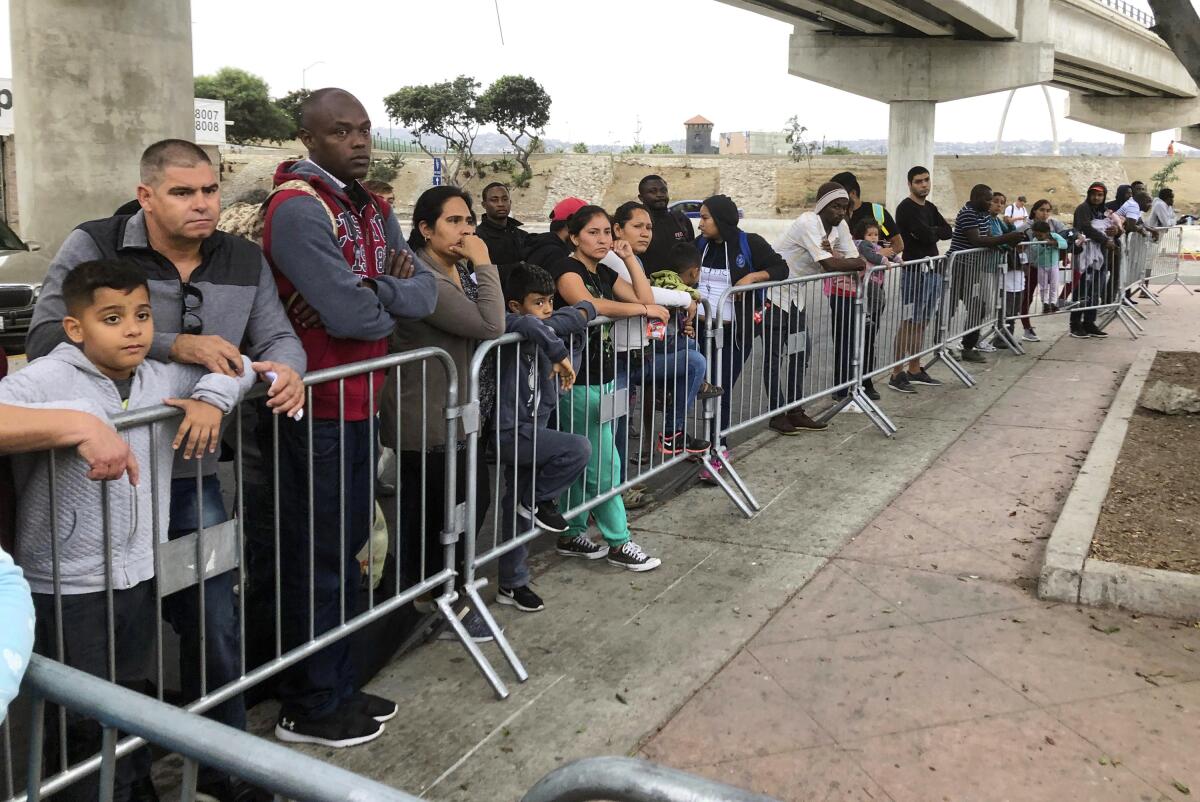9th Circuit says third-country transit ban will not apply to certain ‘metered’ asylum seekers, for now

The three-judge panel allows an injunction from San Diego in the case Al Otro Lado v. Wolf to go into effect
Certain asylum seekers who crossed through other countries before reaching the United States will again be able to request asylum after a federal appeals court on Thursday blocked a Trump administration rule from affecting them.
The rule says anyone who crosses through another country before arriving at the U.S. border must first apply for asylum in that country and be rejected there before the person is able to request asylum in the United States. The rule went into effect on July 16, 2019, meaning migrants who arrived at the border to ask for protection after that date were automatically barred from asylum if they had traveled through countries other than their own.
Attorneys who already had a class-action lawsuit against another federal government policy that limits how many asylum seekers will be processed at ports of entry on a given day — known as metering — quickly challenged the transit rule, calling out the effects of the two policies together.
They argued that migrants who waited in line to request asylum due to metering should not be barred from asylum if they had initially arrived at the border before July 16. The reason these asylum seekers did not request asylum before the July 16 cut-off, they said, was that the federal government would not let them and told them to wait.
U.S. District Judge Cynthia Bashant, based in San Diego, sided with the asylum seekers and temporarily blocked the federal government from using the ban on people who were metered before the cut-off date.
The federal government asked the 9th U.S. Circuit Court of Appeals to allow the rule to continue to be used at the border while the injunction is being appealed.
The government argued that trying to identify who had been metered at the border before July 16 would place a burden on federal resources. The 9th Circuit issued a temporary stay in late December while it decided on whether a longer stay was appropriate.
On Thursday, the panel from the 9th Circuit issued a new order, ruling that the government did not show that it would be irreparably harmed by Bashant’s injunction while the decision is appealed.
“We are dubious that taking the time necessary to make fairly simple factual determinations for a few months constitutes the sort of irreparable harm that can support the grant of a stay pending appeal,” the order says.
In its appeal, the government said that it would take an additional 15 to 30 minutes and as many as 30 additional questions to determine which asylum seekers the rule should apply to under the injunction.
In the 9th Circuit ruling, judges found that even if that were the case, the extra effort wouldn’t amount to irreparable harm. The order suggests that the government should have been tracking who was metered or should ask the Mexican officials who operate the wait lists for help in determining when asylum seekers were turned back from the border.
“That the government’s asserted harm is largely self-inflicted ‘severely undermines’ its claim for equitable relief,” the order says.
The order also doubts whether the government’s claims are true. Evidence provided by attorneys representing the asylum seekers showed that an immigration official had been able to determine that an asylum seeker had arrived at the border after July 16 by asking two questions.
The order is 31 pages long and was written by Judge Marsha Berzon, appointed by former President Bill Clinton, and joined by Chief Judge Sidney Thomas, also a Clinton appointee. Judge Daniel Bress, appointed by President Donald Trump, wrote a dissenting opinion that is more than twice as long at 69 pages.
Bress called his colleagues’ decision part of “cascading legal error” that will wreak “further havoc on a southern border already in crisis.”
“The majority’s refusal to grant a stay is wrong on many levels and forces immigration officials to undertake an effectively impossible mission at our already overwhelmed border with Mexico,” Bress wrote in the dissent.
Asylum cases have already finished for some who were metered and then affected by the transit rule. Such migrants are still able to apply for two other kinds of protection, but those offer fewer benefits. People who win these kinds of protection are not able to get green cards and can never become citizens. They also can’t include family members in those protections.
For some of these migrants who arrived at the border with family, that means even if one family member wins, the others still have to individually prove their cases. That is different from asylum cases, in which a judge can make one decision for several family members together.
After hearing about the 9th Circuit’s ruling, at least one San Diego attorney began to write motions to reopen cases for clients who won these lesser protections in the hopes of changing their outcomes to asylum wins.
The judges’ latest decision in the case is still temporary. The appeal of Bashant’s decision blocking the rule from applying to metered asylum seekers is still before the 9th Circuit and waiting for oral arguments.
More to Read
Start your day right
Sign up for Essential California for news, features and recommendations from the L.A. Times and beyond in your inbox six days a week.
You may occasionally receive promotional content from the Los Angeles Times.







